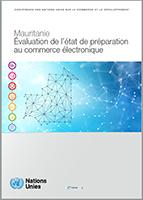
The eTrade Readiness assessment (eT Ready) of Mauritania is the thirty-sixth assessment conducted by UNCTAD. It provides a detailed diagnostic of the e-commerce ecosystem in Mauritania pinpointing both obstacles and prospects for its advancement. It also provides a set of key policy recommendations to address those challenges and to seize the opportunities arising from digitalization.
The main findings are presented below by policy area:
- The government of Mauritania is committed to leveraging digitalization as a driver for social inclusion and better private sector competitiveness. For the last 4 years, a number of initiatives and reforms have been implemented aiming at extending access to reliable and affordable ICT infrastructure. However, the country is in the initial phases of e-commerce development. Therefore, elaborating an overarching e-commerce strategy is crucial to set up the necessary national strategic vision and enhance inter-ministerial coordination with regard to e-commerce policy making.
- Mauritania has an ambitious National Digital Transformation Agenda 2022-2025 which targets the development of the ICT infrastructure and e-government services. The assessment highlights the need to simplify and digitalize government and business support services. It also underlines the country’s expanding ICT infrastructure, with a population coverage by at least a 4G mobile network of 53 per cent (2022), mobile phone penetration rate of 141 per cent (2021), Internet penetration rate of 95 per cent (2022) and Internet use rate of 58.8 per cent (2021) which is almost double of that of LDCs on average. However, the low adoption of technologies by Mauritanian SMEs constitutes a major obstacle for the engagement of the private sector in the digital economy.
- Trade logistics and trade facilitation are major challenges. The lack of a reliable physical addressing system negatively impacts the quality of last-mile delivery services of products ordered online. Facilitating international trade and digitalizing related administration and logistic procedures are perceived as the most pressing factors for fostering cross-border e-commerce development.
- Financial inclusion remains low (20.9 per cent) especially for women (15.5 per cent) and young adults (13.1 per cent). The usage of digital payment services remains limited (16 per cent). Recent initiatives launched by the Central Bank of Mauritania - including the adoption of three strategies related to promoting financial inclusion, electronic payments and financial education - present an opportunity for facilitating access to affordable, interoperable, and secure electronic payment services.
- Mauritania has adopted laws on electronic transactions, cybercrime, data protection and electronic payment services. Reviewing and upgrading its electronic transactions law (2018) to be aligned with international best practices and adopting legislation on consumer protection related to e-commerce are perceived by several stakeholders as crucial steps to ensure trust in e-commerce.
- Developing ICT and e-commerce skills is crucial for the future growth of local and cross-border e-commerce in Mauritania. Relevant skills needed for the further development of the e-commerce ecosystem include understanding procedures related to exporting through e-commerce, e-supply chain management, digital marketing, e-logistics, and cybersecurity.
- Limited access to finance presents a major obstacle for private sector development and especially for MSMEs looking to engage in e-commerce. Credit to the private sector remains low (22.1 per cent of GDP). Mauritania lacks a legal and regulatory framework on venture capital and crowdfunding. The recent Start-up Act presents an opportunity in terms of facilitating access to financing for innovative projects. Further support is also necessary to ensure a conducive ecosystem for Fintech companies.
UNCTAD will collaborate with development partners to support the implementation of the recommendations. This may involve providing technical assistance, capacity building, and facilitating dialogue among stakeholders to ensure effective policy implementation and uptake.
This assessment was made possible through the financial support of the E-commerce and Digital Economy Programme Core Donors (Germany, Switzerland, Sweden, and The Netherlands).


